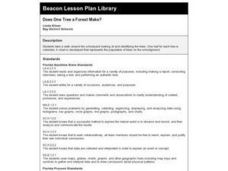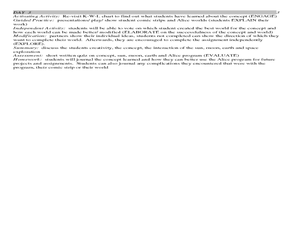NOAA
Into the Deep
Take young scientists into the depths of the world's ocean with the second lesson of this three-part earth science series. After first drawing pictures representing how they imagine the bottom of the ocean to appear, students investigate...
EngageNY
Mid-Module Assessment Task: Grade 8 Module 2
It's time for a concept check! Check for student understanding over the three types of rigid transformations. The assessment follows the first 10 lessons in this series and to test pupils' proficiency of these concepts. Individuals...
Balanced Assessment
County Concerns
Apply area concepts to help farmers and settle county disputes. Scholars use a given diagram and information about an insecticide spraying campaign to determine the monetary benefit to farmers. They then decide which of two counties has...
Curated OER
Draw A Coastline
Students identify, locate and draw at least ten different geographical features on a map. Using the map, they must make it to scale and include their own legend and compass rose. They share their map with the class and answer questions.
Curated OER
Classifying Living Things
Young scholars identify how to classify living things. They classify various concepts including family members, kinds of clothing, numbers, shapes, and vocabulary words. They discuss how to classify various concepts and classify...
Curated OER
Where In the World Are the Resources?
Students use the internet to research the amount of natural resources in a specific area on Earth. In groups, they locate the supply of each natural resource on a map in that area and what can be done to reduce their usage. They also...
Curated OER
Soils
Students apply knowledge of soil, environmental impacts, economics, multiple human demands, and use given data for a proposed scenario in making land use decisions. They debate land use issues and/or scenarios and discuss a case study.
Curated OER
The Importance of Rivers in the Development of Early Civilizations Importance of Rivers in the Development of Early Civilizations
Sixth graders explore the role of rivers in the construction of early civilizations. For this importance of rivers lesson, 6th graders listen to a poem written by Langston Hughes and work cooperatively to develop a graphic organizer to...
Curated OER
Model Mania
Eighth graders study the conservation of matter. In this chemical reaction lesson students examine what happens during a chemical reaction and complete a lab activity.
Curated OER
Barrier Islands
Third graders explore how barrier islands work. In this erosion lesson, 3rd graders create barrier islands in stream tables and simulate wave action to see how it affects their island.
Curated OER
Does One Tree a Forest Make?
Students take a walk around the schoolyard looking at and identifying the trees. One leaf for each tree is collected. A chart is developed that represents the population of trees on the school ground. They keep journals and write an essay.
Curated OER
What Becomes of Cell?
Sixth graders analyze and compare a cell's tissues, organs and organ systems. They watch a video reviewing the body systems and design poster boards showing their functions.
Curated OER
Facts and Myths about our Solar System
Sixth graders explore popular ideas about the Sun and Moon. In this space science lesson, 6th graders separate commonly accepted details about our solar system into facts and myths. Students research a particular idea and create comic...
Curated OER
Looking Inside Cells
Seventh graders analyze and identify the role of the cell membrane and nucleus. They create flash cards to help them review cell structures. They also compare plant and animal cells.
Curated OER
Identification of Wildfire/Structure Interfaces, Risk Assessment of Structures, and Risk Management
Students participate in a class discussion about wildfire and urban interfaces as well as risk of wildfire in the area in which they live. After reviewing a wildfire/urban interface fire safety checklist, a walking field trip is...
















